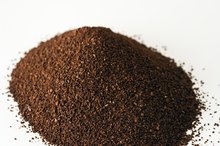Can Drinking Coffee Cause Dry Mouth?
Dry mouth is not a common symptom of drinking coffee. Dry mouth may be a sign of dehydration, which can be a side effect of drinking too much caffeine. If you develop dry mouth from drinking coffee, you need to call your doctor to determine the cause of your symptoms. Dehydration is a serious medical condition that could lead to further complications.
Coffee and Caffeine
Coffee is consumed by millions daily for its effects on the central nervous system. The beverage contains between 102 and 200 milligrams of caffeine per 8 ounces, according to the Center of Science in the Public Interest. Caffeine is quickly absorbed into your blood stream and affects your brain within minutes of consuming coffee. The caffeine in coffee can make you feel awake, more mentally alert and may make you feel like you have more energy. Drinking a moderate amount of coffee, three 8--ounce cups daily, is considered an amount that will not produce negative side effects according to MedlinePlus.com.
- Coffee is consumed by millions daily for its effects on the central nervous system.
- Caffeine is quickly absorbed into your blood stream and affects your brain within minutes of consuming coffee.
Coffee and Dehydration
Vitamins & Minerals in Coffee
Learn More
Dry mouth is a common symptom of dehydration. If you develop dry mouth, along with feeling fatigued, extreme thirst and dry skin, you need to call emergency medical personnel. Coffee has been thought to have a significant diuretic effect on the body, but current research does not confirm that though, according to a report from the New York Times. Researchers found no significant difference in urine output with or without caffeine consumption.
- Dry mouth is a common symptom of dehydration.
Caffeine Overdose
Because caffeine is a drug, you may overdose on the substance without being aware of it. Caffeine is also found in chocolate, tea, certain medications and energy drinks. Caffeine overdose may lead to dehydration and dry mouth, along with heart palpitations, fever, dizziness, confusing, trouble breathing, diarrhea, vomiting, nausea, muscle twitching and convulsions. If you suspect that you have overdosed on caffeine, call poison control for further direction.
- Because caffeine is a drug, you may overdose on the substance without being aware of it.
Treatment
Coffee Allergy & Rash
Learn More
Dry mouth that results from dehydration is treated with increased fluid intake. Stop drinking coffee and all other beverages that contain caffeine until you regain hydration. If you’re severely dehydrated, you may need to be hospitalized and given intravenous fluids to hydrate your body. Dehydration can lead to death if not treated properly.
- Dry mouth that results from dehydration is treated with increased fluid intake.
Related Articles
References
- Drugs.com: Caffeine Side Effects
- MedlinePlus: Dehydration
- MedlinePlus: Caffeine Overdose
- Center for Science in the Public Interest: Caffeine Content
- New York Times: The Claim: Caffeine Causes Dehydration
- Zaragoza J, Tinsley G, Urbina S, et al. Effects of acute caffeine, theanine and tyrosine supplementation on mental and physical performance in athletes. J Int Soc Sports Nutr. 2019;16(1):56. doi:10.1186/s12970-019-0326-3
- Higashi Y. Coffee and endothelial function: A coffee paradox? Nutrients. 2019;11(9). doi: 10.3390/nu11092104
- Temple JL, Bernard C, Lipshultz SE, Czachor JD, Westphal JA, Mestre MA. The safety of ingested caffeine: A comprehensive review. Front Psychiatry. 2017;8:80. doi:10.3389/fpsyt.2017.00080
- National Institute on Drug Abuse for Teens. Is caffeine really addictive? Updated 2020.
- The American College of Obstetrics and Gynecology. Moderate caffeine consumption during pregnancy. Updated 2016.
- Kids Health from Nemours. Caffeine. Updated 2017.
- Beydoun MA et. al. Caffeine and alcohol intakes and overall nutrient adequacy are associated with longitudinal cognitive performance among U.S. adults. The Journal of Nutrition. 2014;144(6);890-901. doi:10.3945/jn.113.189027
Writer Bio
Diane Marks started her writing career in 2010 and has been in health care administration for more than 30 years. She holds a registered nurse license from Citizens General Hospital School of Nursing, a Bachelor of Arts in health care education from California University of Pennsylvania and a Master of Science in health administration from the University of Pittsburgh.









